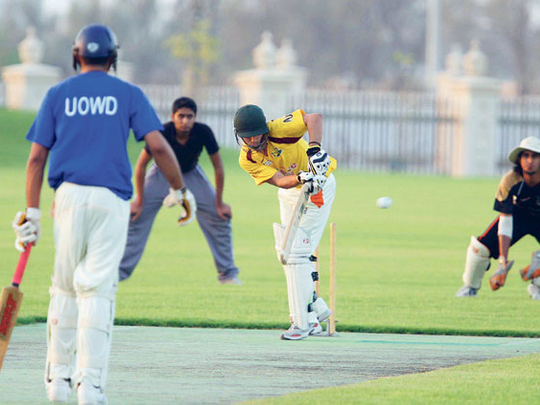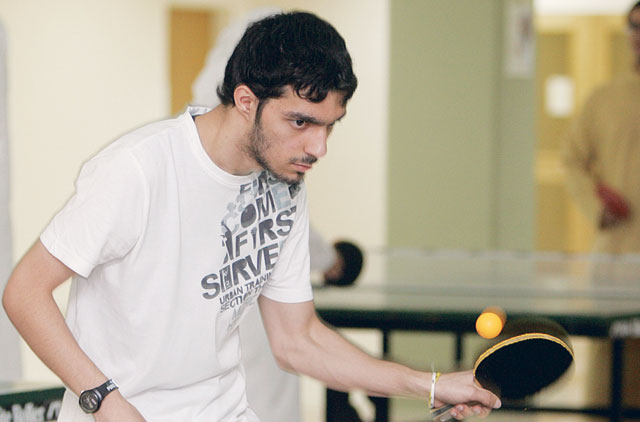
Attend an inter-university cricket, football or basketball match in the UAE and instead of cheering crowds and a healthy rivalry among students, you will find silent venues and empty seats.
Some say it's due to universities not putting any money and effort into developing sports talent. Others argue that there's no point trying to excel at sports because one can never progress beyond the club level as an expatriate. A handful complain that facilities are not adequate and many say students, particularly women, do not care about sports as academics and other activities remain the main focus.
Whatever the reason, it is clear that both athletes and sports officials at universities are not happy with the lack of opportunities when Gulf News spoke to several of them.
Talented cricketer Pranav Arora is one of the lucky few who is able to compete on a national level as cricket is the only sport that allows expatriates to join the UAE national team.
The University of Wollongong in Dubai (UOWD) student who is on a sports scholarship was the captain of the under 17 and under 15 teams and played in the under 19 UAE national team.
However he, too, finds the lack of sports grounds and interest among students a problem.
"People are not interested in playing on cement or sand — there is no motivation. And we are charged money and entry fees for almost every tournament and not all universities are willing to pay these fees."
Arora said it is hard to attract players and while there is talent at universities, the institutions are not willing to support its players or pay for the travel to inter-university competitions.
"It's only those students who have a good attitude that are interested and dedicated. We practise every weekend for three to four hours."
Lack of support
While the UOWD cricket team is very good, there is still a lack of support from their peers at university. "Sports matches are not promoted and there are hardly any spectators because nobody takes the initiative to come watch a match. We also have to play during the day and players end up missing classes to attend matches," Arora said.
Franky Barreto, who is the acting-manager of the UOWD Student Services Department, agrees.
"In the UAE there's not much of a future for sports students — there's no option to make a career out of sports because expats cannot participate in the national team."
Students end up playing sports purely for recreation or at inter-university events during the year. However, of late even those have become few and far between Barreto said.
The university also rewards sporting talent with various scholarships, some of whom have played for the national cricket team. As for poor attendance, Barreto is unsure of the reason. "Even I'm trying to figure this out, it's very strange. But we have a boomers club, which is responsible for getting students to support out matches."
Murdoch University Dubai also experiences problems since it's based in DIAC (Dubai International Academic City) where facilities are limited.
"There are various competitions taking place between universities but as universities are only allowed to put forth one team for each tournament, there is a void for students who enjoy playing sports and who are not on their university team.
"In an area like Academic City there are no facilities built for sports as yet, which means the student population of over 10,000 from various universities have very little opportunity to play sports regularly," said Strategy and Business Development Manager Raghav Lal.
BITS Pilani Dubai, which is also based in DIAC, faces similar problems. M. Rafi Al Deen, manager of student services at BITS Pilani Dubai said: "Time is the main constraint where the focus is more on academics. In UAE institutions there is no encouragement and benefit to the sportsmen. In India, for example, they have a five per cent reservation in recruitment and admissions."
"Also, there are transport problems because universities are located in the outskirts of the city and if any students want to stay back for practice they face problems with transportation," he said.
Emiratis also face challenges
Although Emiratis are able to compete in national teams, athletic sports coordinator at Dubai Men's College Essam Barakat says there are also obstacles for inter-university tournaments among the Higher Colleges of Technology students and externally.
Barakat, who is also the chairman of the Higher Colleges of Technology (HCT) sports association and the Higher Education Sports Federation's technical coordinator for Dubai universities, said talented students, particularly football players, are contractually bound to play only with their clubs and the national teams.
"This means we can't use them for inter-university games because they are loyal to their clubs."
He added that many talented athletes who have contracts with clubs have to also juggle studies that are not related to sports, which is a strain. "We cannot compare to the United States — they have different criteria there."
However, HCT is still competing in regional tournaments such as the second Arab intercollegiate tournament in Egypt this month. Athletes in karate, taekwondo, wrestling, football, volleyball and handball will be participating. The HCT recently started a ranking system for sports and DMC won most of the tournaments said Barakat.
Other organisations have responded to the gap in sporting opportunities by organising leagues and tournaments for young adults.
Among them are Duplays, which has recently started organising inter-university tournaments for football, basketball, beach volleyball and cricket for a fee. The Dubai Women's Football Association (DWFA) also has several keen sportswomen from various universities. "I was educated in Canada and sports are very integral to any education programme there. The issue here is that some universities have great facilities while others can't operate at their own location like those based in Dubai International Academic City," said Duplays co-founder and director of operations Derv Rao.
"What's also lacking is the sense of school pride. When I was a student we used to go to university events and support our teams but it doesn't exist here at all. How often do you see someone walking around with a local university sports shirt? Pride comes from sports."
Due to the lack of cohesion among universities when it comes to sports, Duplays is attempting to implement an informal ranking system, which doesn't exist right now. "We just don't know what the talent is out there because nobody sees them or they don't participate."
The organisation has been approaching universities as well as students who already participate and plans are under way to organise games twice a month. The university is also hiring interns and volunteers to promote tournaments on their respective campuses.
"Most of the universities' managements are very excited about it, especially those that don't have their own facilities," Rao said.
Look elsewhere
American national Reena Sadek at Troy University in Sharjah said it was a frustrating experience trying to find sporting activities to join let alone those for women. She chose to join the DWFA league to compete with other young women.
"That's why we usually have to look elsewhere for activities and sports. But universities like AUD (American University in Dubai) have a very good women's football team [that participates in the DWFA football league].
Barreto said UOWD was supportive of sportswomen and has teams in almost all of the sports available to men.













